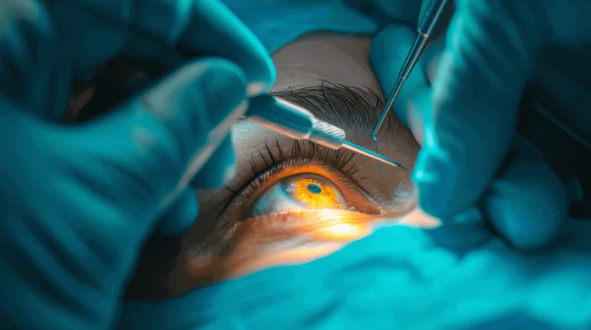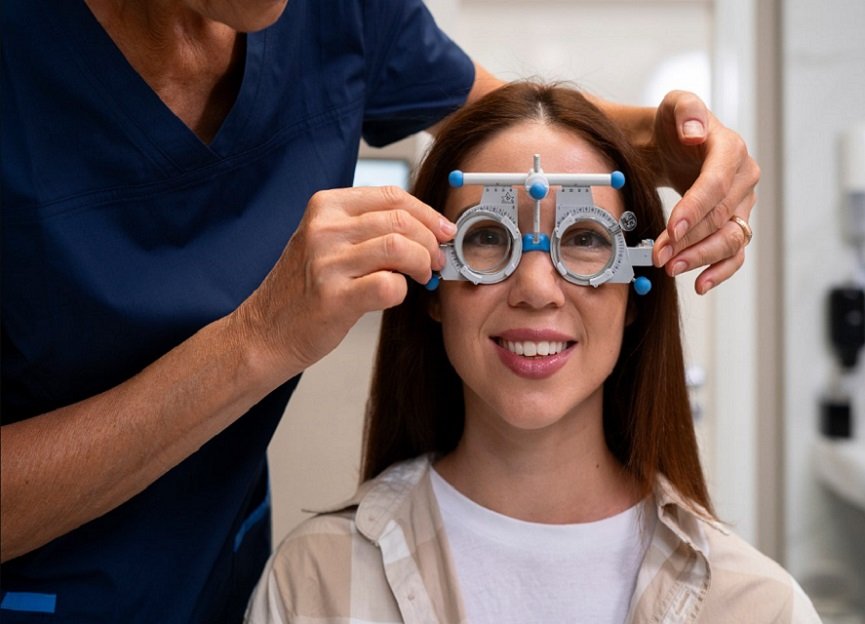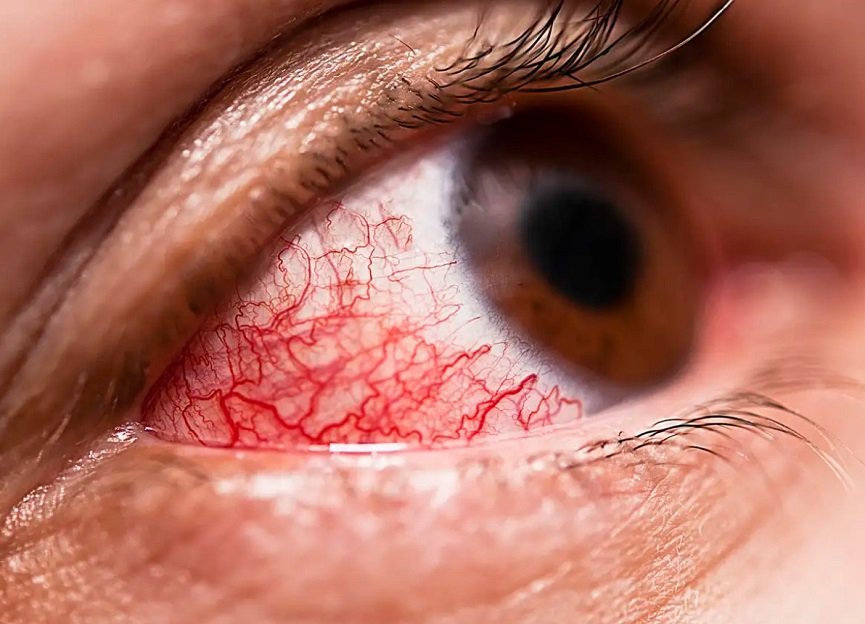
Imagine waking up one day and struggling to see the world around you clearly. Simple tasks become daunting challenges, dimming the vibrancy of life. This is the reality for many who suffer from motiyabind, commonly known as cataracts. It’s a condition that can cloud your vision and significantly impact your quality of life. But there’s hope on the horizon! In Vasundhara, Ghaziabad, advanced treatments are available to restore clarity and brightness to your sight.
Understanding motiyabind is crucial for anyone experiencing its symptoms or seeking treatment options. Whether you're looking for traditional remedies or cutting-edge surgical procedures, being informed can empower you in making decisions about your eye health.
So let’s dive into everything you need to know about motiyabind treatment in Vasundhara—your pathway towards clearer vision begins here!
Causes of Motiyabind
Motiyabind, commonly known as cataracts, occurs when the lens of the eye becomes cloudy. This cloudiness can significantly impair vision.
Several factors contribute to its development. Aging is the most prevalent cause; as people grow older, proteins in the lens begin to break down and clump together.
Genetics also play a role. If family members have experienced cataracts, your risk increases.
Certain medical conditions like diabetes can accelerate their formation due to fluctuating blood sugar levels impacting lens clarity.
Environmental influences are crucial too. Prolonged exposure to ultraviolet (UV) light from sunlight can hasten cataract progression.
Lifestyle choices matter; smoking and excessive alcohol consumption may elevate your chances of developing motiyabind over time.
Understanding these causes helps in recognizing risk factors early on for timely intervention and treatment options available at facilities like AIY Eye Care in Vasundhara, Ghaziabad.
Symptoms of Motiyabind
Motiyabind, commonly known as cataract, presents several noticeable symptoms.
One of the earliest signs is blurred vision. This blurriness may worsen over time, making daily tasks increasingly challenging.
Many individuals experience increased sensitivity to light and glare. Bright lights can become uncomfortable, leading to difficulties while driving at night or navigating well-lit environments.
Another symptom includes double vision in one eye. This can be particularly disorienting and frustrating for those affected.
Colors may appear faded or less vibrant due to changes within the lens of the eye. As motiyabind progresses, these visual disturbances often intensify.
People might also find themselves needing more frequent adjustments in their prescription glasses or contact lenses.
It’s essential to recognize these symptoms early for timely intervention and effective treatment options available in Vasundhara and surrounding areas.
Traditional Treatment Options for Motiyabind
Traditional treatment options for motiyabind, or cataracts, have been utilized for centuries. These methods often focus on herbal remedies and dietary adjustments believed to support eye health.
One common approach involves the use of specific herbs known for their antioxidant properties. Ingredients like bilberry and ginkgo biloba are often recommended to improve vision naturally. Some practitioners suggest incorporating these into daily diets or consuming them as supplements.
Another traditional method emphasizes lifestyle changes. Adequate hydration, a balanced diet rich in vitamins A, C, and E can potentially slow down the progression of cataracts.
Additionally, regular eye exercises may be encouraged by some alternative healers to promote better visual acuity. While these treatments offer holistic benefits, they do not replace professional medical intervention when it comes to severe cases of motiyabind.
Contact us now for expert guidance and personalized cataract treatment options tailored to your vision needs.
Modern Treatment Options for Motiyabind
Modern treatment options for motiyabind, or cataracts, have revolutionized eye care. These advancements focus on precision and patient comfort.
One prominent method is phacoemulsification. This technique involves using ultrasound waves to break up the cloudy lens. Surgeons then remove the fragments through a tiny incision, minimizing recovery time.
Another innovative approach is laser-assisted cataract surgery. This technology enhances accuracy in creating incisions and softening the lens. Patients often experience quicker healing and less discomfort post-surgery.
Intraocular lenses (IOLs) are also a significant breakthrough. They replace the natural lens with artificial ones tailored to specific vision needs. Options include multifocal IOLs that provide clear vision at multiple distances.
These modern solutions make Motiyabind Treatment in Vasundhara more effective than ever before, giving patients renewed hope for clearer eyesight and improved quality of life.
Advancements in Motiyabind Treatment: Vasundhara, Ghaziabad
Recent advancements in motiyabind treatment have transformed the landscape of eye care in Vasundhara, Ghaziabad. Innovative techniques and technologies are now available to enhance patient outcomes significantly.
One notable advancement is the use of femtosecond laser technology. This precise method allows for more accurate incisions during surgery, reducing recovery time and improving vision clarity post-operation.
Additionally, premium intraocular lenses (IOLs) offer enhanced visual performance. These advanced lenses can correct common refractive errors alongside cataracts, providing patients with a broader range of vision without relying heavily on glasses.
Telemedicine has also made waves in this field. Patients can consult with leading motiyabind specialists remotely, ensuring they receive quality advice from the comfort of their homes.
Local clinics like AIY Eye Care are at the forefront of these innovations. They combine expertise with state-of-the-art equipment to deliver exceptional care tailored to individual needs.
FAQs About Cataract Treatment
Q. What is the recovery time after cataract surgery?
Most patients can return to normal daily activities within a few days after the procedure. However, complete healing typically takes a few weeks, and it's important to follow post-operative care instructions for the best outcome.
Q. How long do the results of cataract surgery last?
Cataract surgery generally offers long-lasting vision improvement. Many people enjoy clearer vision for years, although some may still need glasses for reading or distance, depending on individual eye conditions.
Q. Are there any risks associated with cataract surgery?
While cataract surgery is considered safe and highly effective, potential risks—though rare—can include infection, bleeding, or inflammation. Your ophthalmologist will discuss these possibilities before the procedure.
Q. How much does cataract surgery cost?
The cost can vary depending on your location, the clinic or hospital, and the type of lens implant or technology used. It's best to consult directly with your provider for a personalized quote.
Q. Who is eligible for cataract surgery?
Candidacy is typically based on the extent to which cataracts impair your vision and daily activities. If glasses or contacts no longer provide sufficient clarity, your eye doctor may recommend surgery.
Conclusion
Motiyabind, commonly known as cataract, is a condition that can significantly impact your vision and quality of life. Understanding its causes and symptoms helps in early detection and effective management. Traditional treatments have been used for years; however, advancements in modern medicine offer more efficient options today.
For residents of Vasundhara, Ghaziabad, seeking the best motiyabind treatment has become easier with state-of-the-art facilities available at AIY Eye Care. This clinic boasts experienced motiyabind specialists who are dedicated to providing personalized care tailored to individual needs.
If you're facing challenges due to blurred or cloudy vision caused by motiyabind, exploring both traditional and modern treatment methods is crucial. With accessible resources like motiyabind surgery near you and expert guidance from renowned doctors in the area, regaining clear vision is within reach.
Call AIY Eye Care today to book your consultation and explore the safest, most effective solutions for Motiyabind in Vasundhara, Ghaziabad.
Read More
✅ Latest Technologies in LASIK Surgery: What’s Available in Indirapuram Ghaziabad?
✅ Selecting the Right LASIK Surgeon in Vasundhara Ghaziabad
✅ Signs You Need Cataract Surgery: When to See a Motiyabind Specialist in Vaishali Ghaziabad
✅ How to Choose the Best Eye Specialist in Indirapuram
✅ Everything You Need to Know About AIY Eye Care
✅ What is the Difference between Phaco and Laser Cataract Surgery?
✅ Best Refractive Surgery in Indirapuram Ghaziabad: Is Laser Eye Surgery 100% Safe?
✅ Refractive Eye Surgery: What is the Most Common Refractive Surgery?
✅ IOL Surgery: What is an IOL Surgery?
✅ Best Motiyabind Operation Clinic in Ghaziabad: What is the Cost of Motiyabind Operation?
✅ Best Lasik Surgery in Ghaziabad: Which Type of LASIK Surgery is the Best?




